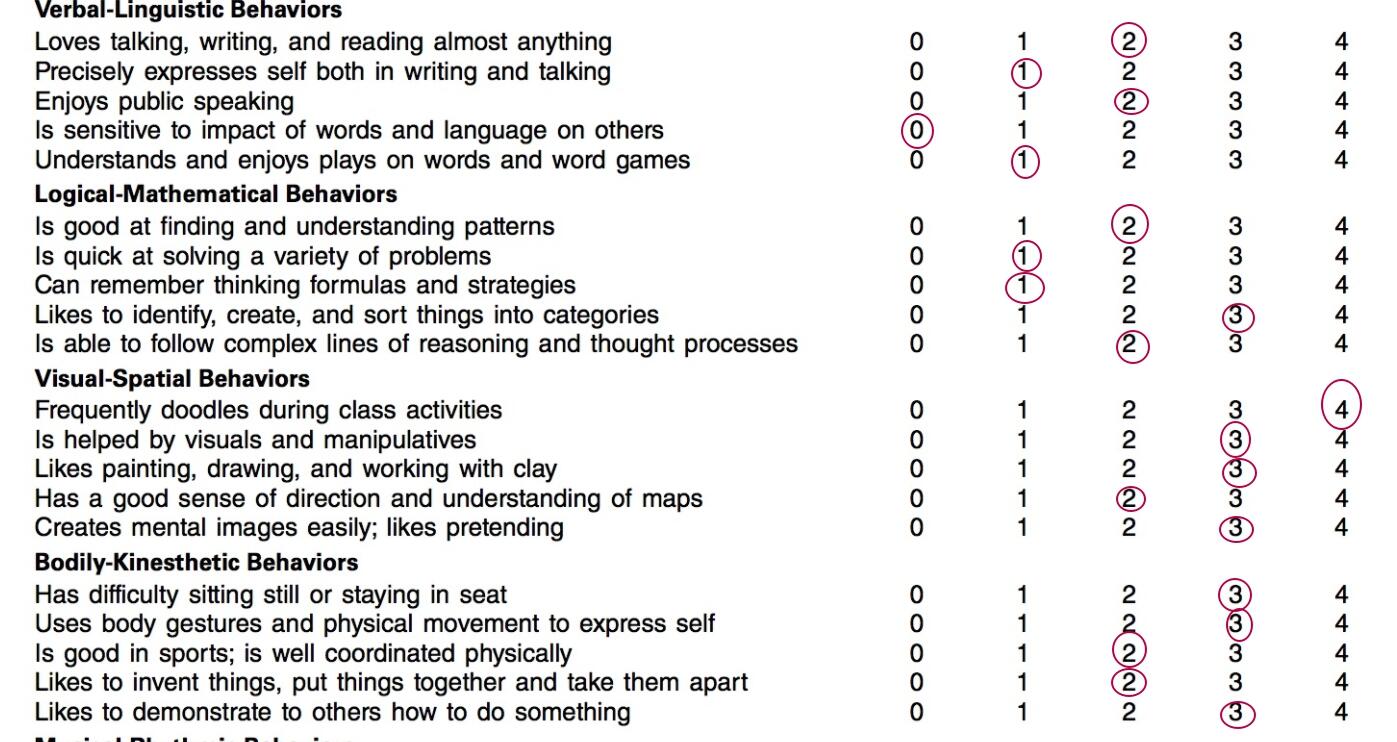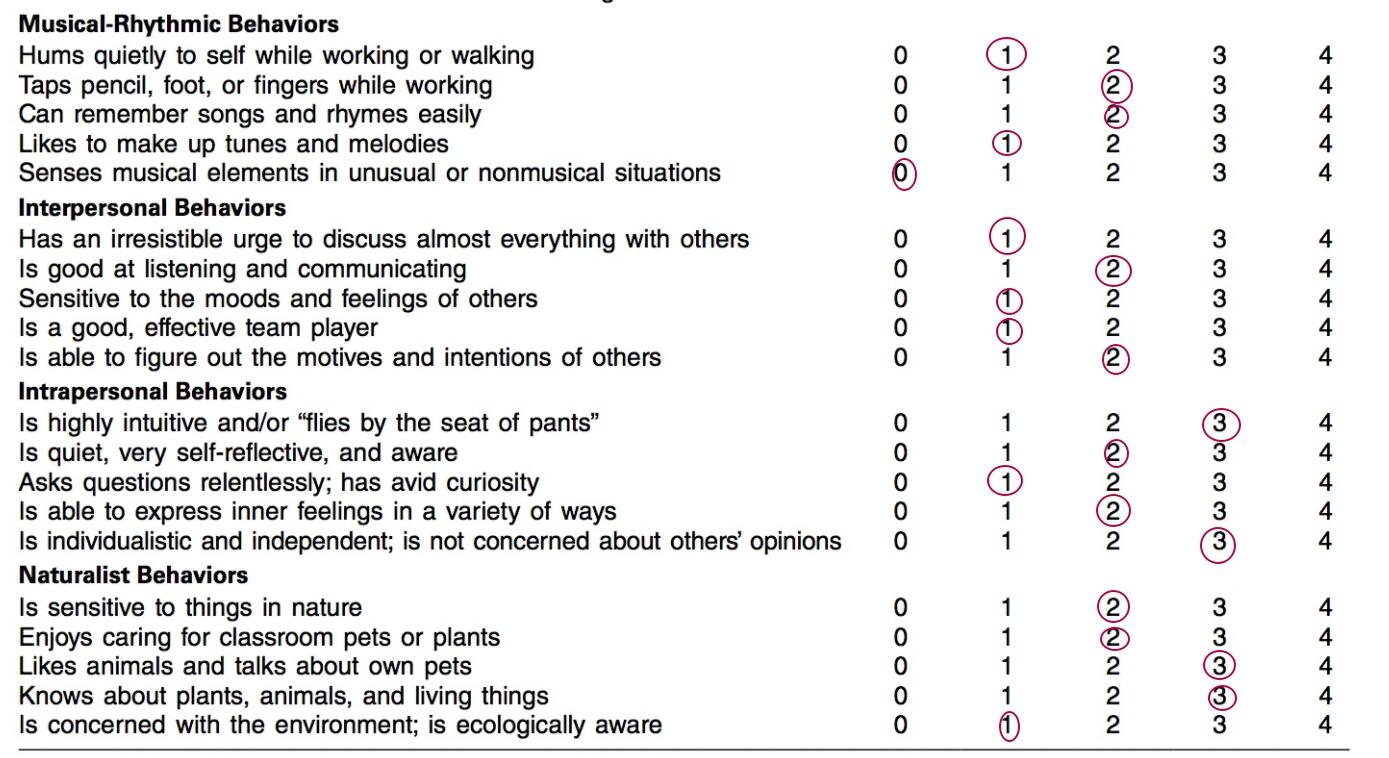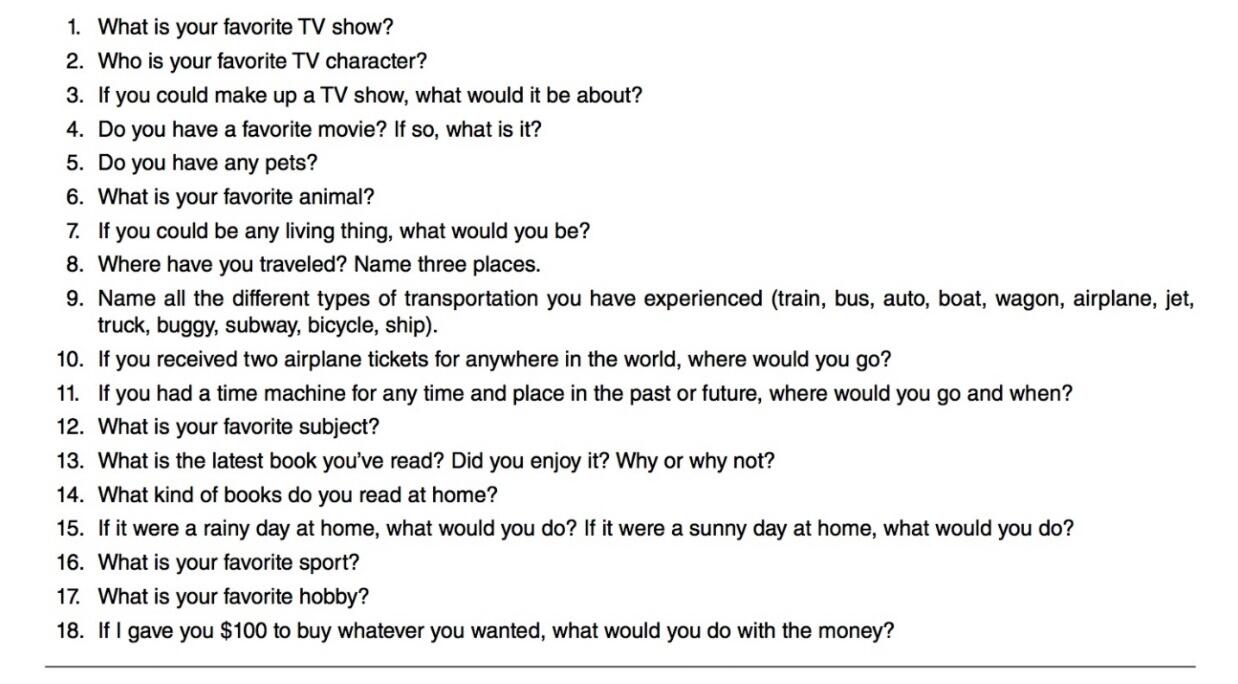The images below demonstrate the student’s answers to the Behavior Log of Demonstrated Multiple Intelligences (see Figure 1, Figure 2):
Name: Alexander Young
Age: 10 years old
Date of observation: 17 January 2018


Student’s answers to the inventory of interests and activities as published by Gipe (2014) are presented below (see Figure 3):
Name: Alexander Young
Age: 10 years old
School: Undisclosed due to privacy issues
Date of observation: 16 January 2018
Interviewer: Tamara Harrington, Alexander’s teacher

- Ask the StoryBots.
- Bo (Ask the StoryBots).
- It would be about computers or animals.
- Paddington.
- Jelly. She is a cat.
- Cats and dogs.
- A cat or a bird because I want to fly.
- Chicago, Disneyland, Los Angeles.
- Train, bus, auto, airplane, subway.
- To India to play with elephants.
- To the future. I would like to meet robots and become one if it’s possible.
- Biology.
- A Beginner’s Guide to Bear Spotting (pronounced with teacher’s help). It was fun. I liked the pictures and the story, but it was not always easy to read.
- I don’t read much. I like adventures and books about animals.
- If it were a rainy day, I would probably watch TV or YouTube. If it were sunny, I would play in the yard with my cat who is always there.
- Running.
- Drawing.
- I would buy a puppy or two puppies.
Based on the student’s answers, the following questionnaire was created for the interview. The answers were collected from the student and his parent (mother).
Questions for the parent:
Do you read aloud to your son?
A: Rarely, but I used to do it four or five years ago.
Does Alexander have many friends?
A: He’s not very talkative, but he sometimes plays with our neighbor’s daughters. He mostly plays with them because they always bring this Golden Retriever along.
Would you call your son sensitive?
A: No, absolutely not. He rarely finds anything insulting. I think he just doesn’t care what others think about him. He has his head in the clouds during classes and at home too.
Would you say that he finds it difficult to understand the motives of others?
A: He understands them well, but he just doesn’t pay attention to them if they do not concern him.
Questions for the student:
Do you like playing or working with others?
A: Sometimes. But it’s easier to work alone. But I can explain some tasks if my classmate doesn’t understand them. It’s not very hard.
Is it difficult for you to pay attention to the materials?
A: Depends on the class. I don’t really like to read or to take part in discussions, so I don’t pay much attention to them. I love drawing though. I also like biology, so I always pay attention to what our biology teacher is saying.
Would you like to work with your classmate on reading assignments?
A: I guess it would be more fun than silent reading.
If there would be more books about animals in the class, would you read them?
A: I don’t know. Maybe. I would if I could take them home because it’s too loud in the class for me to read.
Analysis of Responses
As can be seen, the assessments’ results and the interview questions demonstrate that the child has difficulties in the following areas: verbal-linguistic behaviors, musical-rhythmic behaviors, and interpersonal behaviors. The student does not enjoy talking, writing, or reading, and cannot express himself well in writing. Although he might sometimes enjoy public speaking since he finds it interesting to help others, he is rarely sensitive to the moods of others. He is also not an effective team player because he prefers to work independently and is generally quiet. Nevertheless, he finds it difficult to pay attention to others (especially those subjects he does not find interesting) and he often “daydreams” during the classes. The scores in all of these areas were lower compared to others (see Figure 4):
Figure 4. Student’s score on multiple intelligences.
The student demonstrates the highest level of ability in the following areas: visual-spatial, bodily-kinesthetic, intrapersonal, and naturalist. Such results indicate that the student will benefit from instructions that are graphic, require physical movement, include self-reflective tasks, and are focusing on the natural world. The student’s learning style can be defined as primarily bodily-kinesthetic, as well as visual-spatial. His answers about personal interests indicate that he has a well-developed imagination but is shy and prefers to work and play alone rather than with others. Alexander finds it difficult to express himself using words, which might cause difficulties when communicating with peers and adults. However, the child can figure out the motifs of others well if they directly concern him, which indicates that his interpersonal behavior can be developed further if the teacher can shift his self-centered focus. Together with group assignments, Alexander might need support in developing his musical behavior, as he does demonstrate some abilities (taps fingers, can remember poems if he likes them, sings songs from favorite TV series).
Next Steps Plan
To support Alexander’s learning style (bodily-kinesthetic/visual-spatial) and address the identified gaps in other, less developed intelligences (verbal-linguistic and musical), the following plan is proposed:
- Provide manipulatives for the child and integrate them into the classroom (e.g., use puzzles with animals during the biology class to create visual-spatial activities, incorporate presentations and videos into class assignments)
- Create a dance circle where the child can move and participate in a group activity simultaneously
- Use role-playing as a form of instruction (ask the child to participate in a demonstration of the task with peers)
- Engage computers and tablets in stimulating visual talents (e.g., design simple figures during the arts or science classes)
- Combine tasks that target visual-spatial and verbal-linguistic behaviors (after a read-aloud of a classroom book ask students to draw main characters, sketch a scene from the book, etc.). This assignment will require the student to reread the paragraph for references.
- Ask the child to participate in a publishing contest. All students will need to provide essays on a given topic. Ensure that all children’s work is appreciated (no win or lose situation).
- Engage parents in writing. Ask Alexander to keep a diary where he would describe his activities at home. Ask the parents to help him notice and correct mistakes. This assignment can also improve his interpersonal communication.
- Assign a peer buddy who demonstrates good verbal-linguistic and musical behavior. Ask them to make up melodies and songs about a classroom topic together with Alexander (this assignment targets both musical and interpersonal areas).
As can be seen, specific changes in instructions are necessary to support the child in his needs. Overall, the child demonstrates relatively good results in the majority of multiple intelligences, although he requires some assistance to improve his performance in reading/writing and communicating with others.
Reference
Gipe, J. P. (2014). Multiple paths to literacy: Assessment and differentiated instruction for diverse learners, K-12. Upper Saddle River, NJ: Pearson Higher Ed.